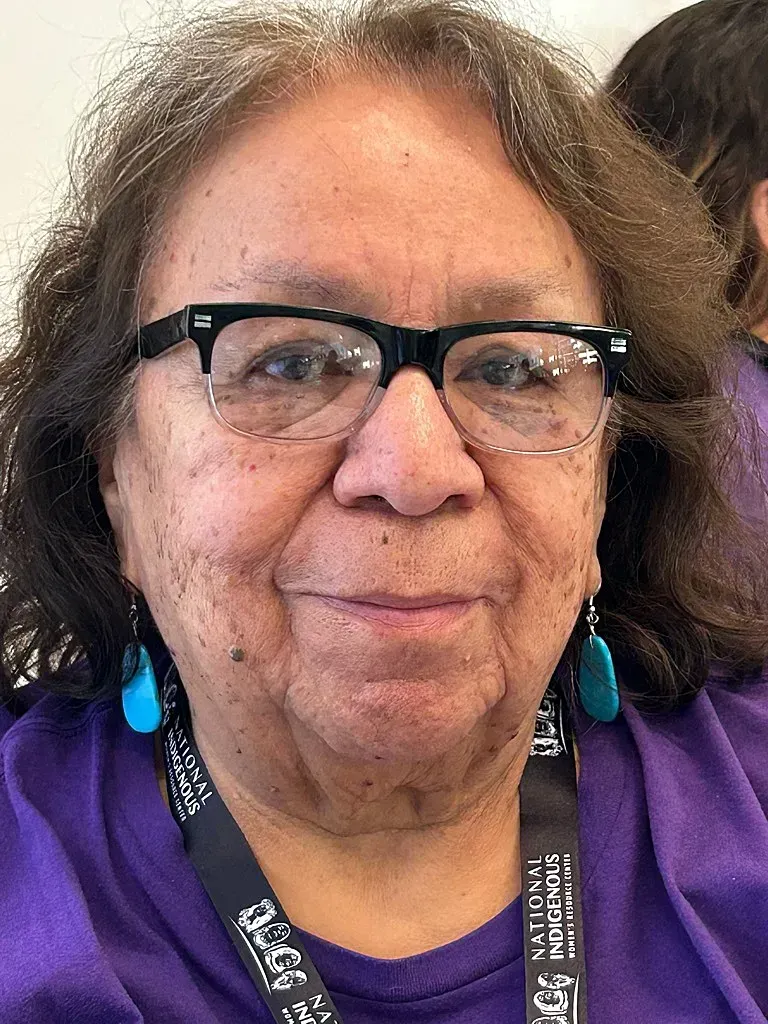
Hero for Native Women: Bonnie Clairmont’s Lifelong Stand Against Violence
By Staff, Cherokee 411
MILWAUKEE (Aug. 2025) — Bonnie Clairmont has been standing up to violence since childhood. This year, the Ho-Chunk advocate was honored with the Tillie Black Bear Women Are Sacred Award from the National Indigenous Women’s Resource Center, a recognition that affirms her decades of work on behalf of Native women.
Clairmont, 75, traces her passion to her mother, Elizabeth, who sheltered battered relatives inside their home in St. Paul, Minnesota.
“There was no police help back then, so my mom sheltered battered relatives at our house,” said Clairmont. She remembers perpetrators pounding on the family’s door, demanding access. Elizabeth would stand her ground.
“‘Leave us alone, or I’ll call the cops,’ and even, ‘I’ve got a gun!’ she’d yell at them,” Clairmont recalled. The weapon was real, though unloaded. “It was an old shotgun, kinda rusty, but she’d wave it from the window.”
Following in Black Bear’s footsteps
The award is named for Tillie Black Bear, Sicangu Lakota of the Rosebud Sioux Tribe, often called the grandmother of the movement to end violence against Native women. Black Bear helped found the White Buffalo Calf Women’s Society shelter in 1977 and later the women’s resource center. She died in 2014 at 67.
In her honor, the center launched the Women Are Sacred Award in 2015, recognizing grassroots advocates who center survivors and community.
“Since 2015, the Tillie Black Bear Women Are Sacred Award has honored Tillie’s life and legacy,” said Lucy Simpson, Diné, the center’s executive director. “This year, the committee reviewed more than 60 nominations from across Indian Country, and Bonnie was chosen for the extraordinary heart she brings to this work.”
Past recipients include Coleen Clark of the Fort Peck Assiniboine and Sioux Tribes, Carmen O’Leary of the Cheyenne River Sioux Tribe, Sandra Pilgrim Lewis, Lakota, Leanne Guy, Diné, and Tami Truett Jerue of the Anvik Tribe.

Members of the Woodland Sky Dance Company perform during the opening ceremony in Milwaukee at the Baird Center during the National Indigenous Women’s Resource Center Women are Sacred conference in late July 2025. Credit: Mary Annette Pember/ICT
Gaining ground
In 2009, Clairmont joined the Tribal Law and Policy Institute at the request of attorney Sarah Deer of the Muscogee (Creek) Nation. As a victim advocacy specialist, Clairmont has focused on drafting resources to help tribes incorporate victims’ rights into their justice codes.
Her 2022 guide encouraged tribal governments to embed traditional values of compassion and protection into law. Recommendations included no-contact orders, the right to be informed, protection from intimidation, access to traditional healers, and grievance procedures.
Clairmont said her mother instilled in her the belief that communities must also confront root causes of violence. “We’ve been colonized to put aside our traditions that used to keep us in line,” she said.
Grounded in tradition
Like Black Bear, Clairmont believes tribal traditions are central to ending violence. Black Bear’s work was grounded in Lakota spirituality, and she named her first shelter for White Buffalo Calf Woman, a sacred figure teaching respect for women.
“Tillie understood such organizations were essential in the long-term struggle to reestablish the safety of Native women and the sovereignty of Indian nations diminished by systemic colonization,” Simpson wrote in Restoration Magazine.
Clairmont echoed that sentiment. “I’ll continue to do what I’ve always done with my ancestors and mother — just standing strong for what I believe in and being there for our relatives.”
A lifetime of advocacy
In Minneapolis, Clairmont once served as the city’s only sexual assault advocate. In the late 1980s, when three Native women were raped and murdered, she and members of the American Indian Movement patrolled the streets and offered escorts home. She organized support groups, self-defense classes, and police trainings.
“Those with addiction problems are often targeted by perpetrators; victims don’t choose to get attacked,” she said, urging officers to see victims as daughters, sisters and mothers.
Over time, she realized advocacy was about more than individual cases. “It’s really gratifying when you see people empowered to find their own voices and new places in life,” she said. But she also recognized systemic inequities fueling the violence. “That was my a-ha moment.”
For Clairmont, the fight has always been personal — and it continues.
#MMIW
